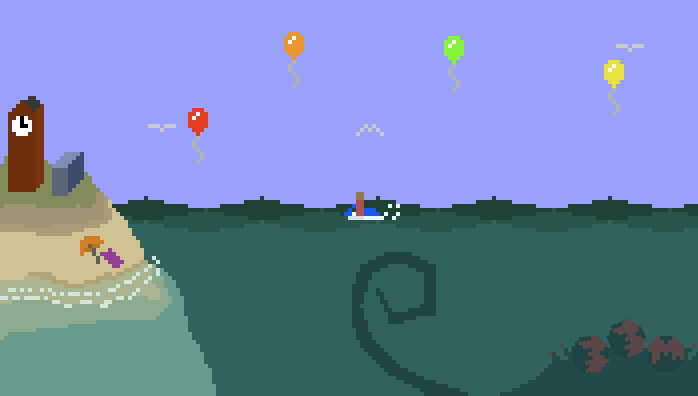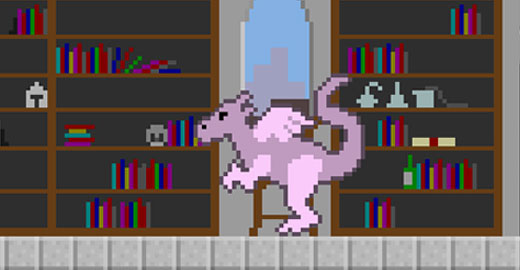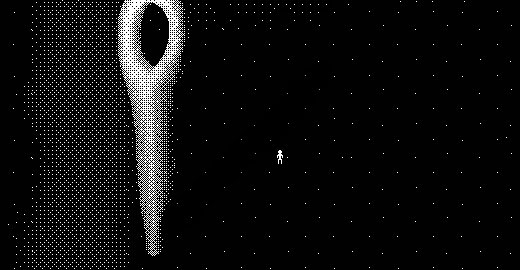To say that Gregory Weir thinks outside the box with his game designs is something of an understatement. He was never in the box in the first place. This is a man who draws the inspiration for his games not from what others in the gaming industry are doing but from his own dreams and hyperactive imagination. As a result, Gregory's games are like nothing else you will have seen, and they are all the better for it.
We first came across Gregory when we were undertaking research for our Five games that make you think about life article published around a year ago. One of the games we included in the list was (I Fell in Love With) The Majesty of Colors, a brilliant but disturbing adventure game where you play a scary-looking sea monster. In spite of your terrifying appearance, you start the game as an innocent creature, curious about the world. But your first contacts with humanity threaten to corrupt you. Feeling rejected and persecuted, do you turn bad and use your considerable powers for evil purposes, or do you strive to do good?
The Majesty of Colors is typical of Gregory's work. His games are notable for their unique ability to make you reflect on the nature of life. They are often creepy and disturbing. And, although the game-play mechanics might not get your adrenaline rushing, and the graphics are nothing to write home about, you never feel unsatisfied after playing one of his games. Indeed, thanks to their intriguing storylines and offering up of ambiguous moral choices, they often light up parts of your brain that are usually only sparked into life by reading poetry or looking at art. They are indeed - in our opinion - works of art.
 Majesty of Colors
Majesty of Colors
The Majesty of Colors is a brilliant but disturbing adventure game where you play a scary-looking sea monster.
Gregory's latest creation is The Day, a game that on the surface appears to be a weird combination of card-playing and exploration but on further probing is actually something far more disturbing. Odd references to murderous guards in the forest, and surveillance cameras that swivel to follow your character around, envelope the game with an almost suffocating sense of foreboding. That this sense is completely at odds with the almost child-like quality of the actual game-play serves only to amplify it all the more.
You get a similar strong sense of something is not quite right in Babies Dream of Dead Worlds, a platform game that explores the unsettling other-worldly dreams of new-born babies. Looming - an atmospheric exploration adventure game - is also dripping with a mysterious other-worldly quality. Other of Gregory's games are more light-hearted, such as the charming How to Raise a Dragon, an interactive story-cum-game where the choices you make determine how your pet dragon will turn out.
And we can't finish without mentioning Silent Conversation, perhaps the most edifying game ever made. It is a platform game but where the platforms are made out of the words from poems. So you can read great works of literature while you play.
In our view, the gaming industry needs people like Gregory Weir. Free thinkers who are willing to take gaming off in weird and wonderful directions regardless of what everyone else is doing. Hopefully, at some point, the mainstream gaming industry will take note of Gregory's work, and incorporate some of his best ideas into their games. So here's to a future high definition remake of the Majesty of Colors for the X-Box!
Much to our delight, Gregory agreed to answer a few questions for us.
How did you get into game development?
I've always loved video games, and ever since I played around with programming as a kid I made simple games as programming exercises. One summer, I took a class on video game development at a gifted program for kids at Arizona State University; it was mostly taught using Klik and Play, and the games I made were mostly terrible. As I grew up, I continued playing around with things like Megazeux; I've released a couple of those on my website - see here.
I was an early follower of the indie games movement thanks to sites like Home of the Underdogs. In college, my senior thesis was on video games and artificial intelligence. Once I graduated, I worked at a web development company for a while before quitting and trying out game development as a career. Ever since I released Majesty of Colors, I've been able to support myself on video games, more or less.
Your games always have very imaginative, thought-provoking themes. Where do you get your inspiration for your games?
It's always hard for an artist to talk about the source of their inspiration! I tend to come up with a lot of ideas, and they usually start out as strong images or high concepts that get fleshed out into a proper game idea. Sometimes they come from dreams, but more often than not they're just a result of my mind wandering. I have a very active brain - so much so that I often suffer from insomnia - and it tends to generate a great deal of ideas that I find interesting.
Your games also often have a mysterious, slightly disturbing ambiance - The Day and Looming, for example? Is there a secret to imbuing your games with that quality?
Yeah, a lot of my games are dark or creepy. That's the sort of story I tend to be interested in. I see art as fundamentally confrontational. The most interesting art is art with passion, and a work that doesn't disturb the player is less likely to affect the player. I think it helps that I visualise the worlds of my games as fully realised worlds; I may not know all of the details, but they seem somewhat real to me. Hopefully, that comes across in my work. Alien worlds are fundamentally unsettling, I think.
A lot of your games use basic 8-bit style graphics. Do you think the obsession with ever fancier graphics is distracting gamers and game makers from what games should really be about?
I think a focus on technologically-advanced graphics has the potential to distract players and developers, yes. Fancy graphics are not at all a bad thing; often, a game concept calls for fancy graphics. The 2008 Prince of Persia wouldn't be the same game without its painterly style, and there are many games for which photorealism is entirely appropriate.
I would like to see more non-realistic games, though. I think the indie games movement is doing a good job of reminding people that 2D graphics and pixel art haven't lost their relevance or potential. Just because we can create photorealistic, 3D worlds doesn't mean that's the approach most appropriate for every game.
What should games be about?
Everything. There should be games about every concept on Earth. The vast majority of games are about war, or really about a guy killing a bunch of other folk. That can be fun and interesting and artistic but there's the big broad space of ideas that we've only touched upon. I want to see more cooking games, or romance games, or games about ice fishing.
 How to Raise a Dragon
How to Raise a Dragon
In How to Raise a Dragon, the choices you make determine how your pet dragon will turn out.
Do you think games can be considered to be art?
Yes. All games are art. Art's not some mysterious, exclusive concept that's tricky to get right. Any time a person's expressing herself aesthetically, she's making art. There's no magic in interactivity that removes the artistic merit from a game. Mario is art. Quake 2 is art, even if it isn't saying much. Katamari Damacy is definitely art.
Can arty games be a commercial success?
Sure. Bioshock is arty as hell. It's Art Deco and explores Objectivist themes, among other things. Myst is arty. Both of those sold really well. And depending on how you define 'commercial success', there are tons of other examples. Braid paid for itself many times over, I believe. Heck, my games keep me fed and clothed, so I think they count as commercial successes.
Which of your games are you most proud of?
I'm proud of (I Fell in Love With) The Majesty of Colors because it was my first game that made people aware of me on a broad scale. I also think I did a good job of translating an initial game concept into a very similar finished form, especially with how new I was to game development at the time.
I'm proud of Exploit because I think it does the best job of all my works of being a fun game. A lot of my stuff lacks immediate gameplay-based fun, but I still play Exploit as a game and not as a story. I'm proud of Looming because I did the best job of polishing it and making it a fully-realised game. There are a lot of things I'd add to my games, if I had the time and the chance to do them again. There's very little I'd add to Looming.
What do you consider your most successful game?
Success is really hard to define. Looming is my best-crafted game, I think. How to Raise a Dragon has been played by at least three million people. Majesty of Colors has been listed on the syllabi of multiple college video game design courses. It's hard to say which of those is most successful.
What game are you working on at present? Is there anything you can tell us about it?
I'm working on a few games at the moment. Millions of Space Stations (working title) is a procedurally-generated Metroidvania that I've been working on intermittently for about a year. The game I've been developing most actively lately is Beneath the Waves, which is about romance and retrieving stolen idols from an ocean god. It's (very loosely) based on Waves, the Ludum Dare entry I put together earlier this year. My fiancee and I just resumed work on Namatjira, which is a game about surveying a planet for colonisation and lying about it.
Do you do both the art and programming for your games. Which of these two disciplines do you prefer?
I tend to do both, yes. I'm much better at programming than art; I've got a bachelor's degree in computer science, while I've only taken a few art classes. I'm sure that has something to do with it. I think I'm improving at making visual art, though. For Millions of Space Stations, I'm collaborating with an artist. His art is much better than mine.
Is it possible to make a good living out of developing casual games?
Sure! Speaking for myself, I made much more per year as a web developer for a large corporation than I do now. But I make enough to live on. I believe there are many casual developers who are much more financially successful than I am, and I've got plans in the works to make more money. I don't have any plans to stop making video games.
Are their any game developers whose work you particularly admire?
Oh, there are many developers I admire. Anna Anthropy, 2D Boy, Jonas Kyratzes, Valve, Markus Persson, Edmund McMillen, Keita Takahashi, Derek Yu… there are so many developers making such awesome stuff that I really couldn't narrow it down to just a few.
What is your favourite casual game by another developer?
I'm not sure how I'd define 'casual'. The game that comes to mind at the moment is World of Goo. It's very accessible, both in terms of interface and style, and yet it provides a ton of depth.
What are your plans for the future?
I'd like to make bigger games, and games that are better-polished than a lot of the works I've released. I feel like I'm still growing as a game developer, and I'm looking forward to seeing how I turn out.



Add comment
-
-
-
SubmitPublished by Very Cool on 1st November 2010